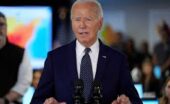Molly Minturn - My family is heartbroken to share that my father died in surgery on Monday, Feb. 10. It…
Wednesday Night #1387
Written by Diana Thebaud Nicholson // October 1, 2008 // David/Terry Jones, Herb Bercovitz, Reports, Wednesday Nights // 1 Comment
Politics
Canada
In yet another departure from Wednesday Night traditions, the first part of the evening was dominated by the televised Canadian Leaders’ debate in French. Certainly less entertaining and generally more civil than its U.S. counterparts, the round-table format received mixed reviews. The opposition attack pack focused on Mr. Harper with considerable success, managing not to trip over one another in the process. Elizabeth May was the surprise of the evening, as the leader of the Green Party demonstrated good comprehension of the French content and, despite being pronunciation and grammar challenged, she held her own. Stéphane Dion was also an agreeable surprise, as he looked calm, thoughtful and avoided lengthy professorial lectures. Mr. Harper, on the other hand appeared to be on valium and never looked the camera in the eye, all in all, not a sterling performance. There were no surprises in content and while it appears more and more likely that there will again be a minority government, only the fiercely partisan will venture more than a tentative bet on the outcome.
U.S.
Still, the imminent U.S. Vice-Presidential candidates’ debate appears to have eclipsed the concurrent Canadian Parliamentary debate, the focus being on the state of health of an aging John McCain and the ability of Sarah Palin to run a government in the event of his death or inability to perform his presidential duties. It is less her intelligence that is in doubt than it is her breadth of knowledge in the light of her perceived conviction in her own belief system.
As for the debate, it is likely that she has been extremely well briefed on all possible questions to be raised and on her answers, as well as on all what to emphasize and what to avoid. Although Canadians will undoubtedly find the debate fascinating theatre, the Palin story has awakened Wednesday Nighters to the place and importance of religion in contemporary life; less the religion of the purveyors of organized religion for the purpose of self-aggrandizement or to promote a cause, but in the spirit of the purest Judeo-Christian spirit. The ancient Romans placed no value on human life; individuals, men, but more so, women were subservient to the state. Gods were viewed as cruel and subject to the same frailties as humans. The origin of the Christian faith reawakened the Judaic view of the sanctity of human life and the concept of guilt, repentance and redemption, reiterated once more by the prophet Mohammed. Many of the ills of this world have unfortunately been perpetrated by practitioners of religion who have subverted the purity and selflessness of the Judeo-Christian tradition to further their own agenda.
The economy
For some, the sudden drop in the Dow-Jones and T.S.X. indices have conjured images of 1929. In fact, although the excesses that have caused the current problems are real, the preponderance of banking stocks in both the Dow-Jones and T.S.X. have exaggerated the reality of the situation, masking the fact that money can be made even in a falling market. Many U.S. and Canadian stocks have been doing very well and have gained in value during the credit crisis. With the bailout bill easily passing in the Senate, it will undoubtedly pass without difficulty in the House of Representatives. Ultimately, money will be made by the non-payment of mortgages. The opposition to the bailout was less of a media issue than a lack of communication. [Editor’s note: while that was true to a certain extent, the opposition of “Main Street” to the bailout seemed more and more justified in light of subsequent events and analysis of the new Bill, which revealed the shameless pork barreling that one had hoped might have been curtailed at a moment of crisis. So much for putting aside election-year politics.]
Energy
Energy, particularly clean energy, is a constant Wednesday Night topic. The Nova Scotia wind power project (see study on wind integration) is judged too expensive and the energy created too erratic, requiring backup power. Some see the future of bio-fuels derived from algae as being an energy source, but ultimately, nuclear energy will undoubtedly replace most carbon based sources.
P R O L O G U E
TO PARAPHRASE JAMES CARVILLE: IT’S THE FINANCIAL CRISIS, STUPID – IT’S ALSO POLITICS, FOREIGN POLICY, ENERGY, THE ENVIRONMENT AND, OH YES, ELECTIONS, TO NAME A FEW.
We are on overload of analysis, information and opinion on all of the above. And we haven’t even mentioned such close-to-home topics as arts funding. Then, there’s Sarah Palin and the scary thought of her as Vice President; of course she also comes under all the headings.
Was the bailout a good idea? Was it defeated by really poor communication with Main Street? What happens next? We can sort-of answer that: we have a vote in the Senate, and in the great tradition of Wednesday Nights, the vote is Wednesday evening. What will happen? Given the range of expert opinions published by the media of all stripes, we know that Wednesday Nighters can come up with equally valid analyses and strategies, so we call on one and all to do so. If you can’t be with us, then please forward your thoughts.
For some of the diversity of opinion out there, see The evolving bailout plan and Banks
Here’s a thought for the globalization gurus: In Wall Street’s fall from grace, a lift for others?
(IHT) For several years, London has been stealing a march on Wall Street as a hub for trading currencies and financial products. Hong Kong and Tokyo aren’t too far behind. And now, new hubs emerging in developing countries are trying to secure regional, if not international, influence. If Wall Street’s reputation takes a permanent hit as a result of the current woes, it could create space for all of the up-and-comers. At the very least, it could create new incentives for countries outside the United States to develop their investment banking and financial intermediation services. For those who seek a deeper meaning to the crisis, we strongly suggest The Political Nature of the Economic Crisis
(Stratfor) Economics is not a freestanding discipline, regardless of how it is regarded today. It is a discipline that can only be understood when linked to politics, since the wealth of a nation rests on both these foundations, and it can best be understood by someone who approaches it from a moral standpoint, since economics makes significant assumptions about both human nature and proper behavior.
The modern penchant to regard economics as a discrete science parallels the belief that economics is a distinct sphere of existence — at its best when it is divorced from political and even moral considerations. Our view has always been that the economy can only be understood and forecast in the context of politics, and that the desire to separate the two derives from a moral teaching that Smith would not embrace.
For the American geopolitical junkies among us: check out the Economist’s Global Electoral College and vote – at least it will give you a sense of empowerment!
For the political masochists, do see the latest on Sarah Palin and prepare the Bromo-seltzer for Friday morning after the Biden-Palin debate – Better yet, don’t watch the debate, go to the Cassandra’s Lilacs” concert and feel good about yourself, if not about the rest of the world! Of course, if that option is not possible, then watch the (English) Leaders’ Debate.
On the topic of Canadian elections, we have recently discovered Reality Check, an entertaining page on CBC’s website
Finally, Premier Jean Charest gave an excellent speech to CORIM on Tuesday (some suggested that an election is in the offing) focusing on Quebec’s role in international affairs and, of particular interest to some of us, Quebec’s role – and responsibilities – in the Far North. Worth reading and keeping an eye on.




One Comment on "Wednesday Night #1387"
Taking up your offer to comment on the financial actions in the U.S., we judge it to be a reflection of the long-standing erosion of “trust” in U.S. political institutions.
It is hard to find an instance over the past generation in which these institutions have deserved the “trust” that they have sought–and usually been accorded. You can make your own list, but from left, right, and center, our leadership has profoundly disappointed.
You don’t get a situation in which public support for the president is 30 percent (before this crisis) and support for Congress around 20 percent and expect the public to follow.
Moreover, the entire frenzy/rush suggested panic rather than perspective: a panic to help those who are rich and privileged/pampered. A rush to “help” with “my money” individuals and institutions that make sums that are incalculable for the “severely normal” Amcit outside the Beltway.
So occasionally, the political structure may be better off letting the people have their way. It would ultimately be more destructive to force a huge public expenditure–that may well not work–than to do nothing other than let the “system” work itself out. If the people have been warned that pain will be the consequence of inaction–and there is pain–well, they have chosen pain. If they have massive expenditure forced on them–and there is still pain, trust will be even further eroded.
To be sure, the adage that “If you can keep your head while all about you others are losing there, it means that you really don’t understand the situation” could be true.
But nobody is going to starve in the streets–and the “system” will work itself out. Anyone who says they have/know the answer is lying (perhaps only to him/herself, but lying just the same.) And the experts in the end are still guessing along the line of “laying all the economists end to end without reaching a conclusion.”
So yes, I expect an “answer”–that will show that the ostensible leaders have done something. But it will take some while to determine whether a decision not/not to make a decision would have been the better decision.
David & Terry